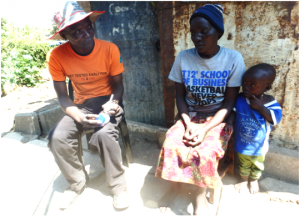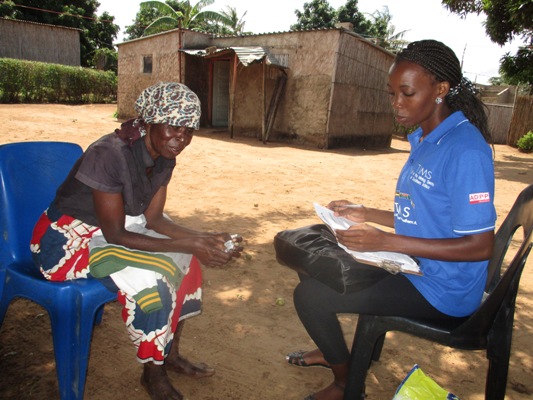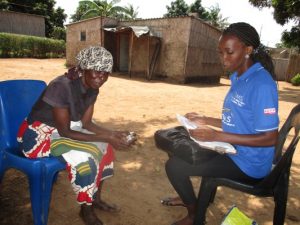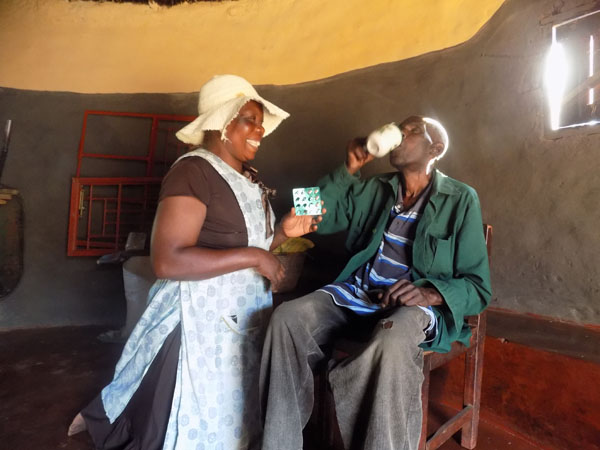
by dapp | Apr 10, 2018 | Blog, News
Farmers’ clubs Zimbabwe projects are engaging farmers in Masvingo ,Makoni, Mutasa in promoting the cultivation of small grains such as millet and sorghum to boost food security.
Farmers’ clubs Project Leaders agree that small grains such as sorghum, pearl and finger millet are vital for food and nutrition security. They says their drought tolerant nature make them able to thrive better in drier areas.
Farmers also received education on the benefits of growing small grains. They were taught that, sorghum and pearl millet are rich in potassium and calcium which are important for healthy bones and teeth while finger millet is rich in iron which is important for children under five years, pregnant women and the chronically ill patients.
Farmers welcomed the initiative and managed to produce a substantial amount of the small grains.
Following the good harvest Farmers were also educated on storage of the small grains discovering that as compared to maize Finger millet has long storage life and is rarely attacked by insects.
Ministry of Agriculture is on record saying that growing small grains is a proven approach for improving household food security.

by dapp | Apr 10, 2018 | Blog, News
DAPP Total Control of Tuberculosis is empowering every individual to fight TB and HIV through repeated mobilisation, information dissemination, education and basic counselling at their doorstep.
The program uses its unique strategy of mobilising people to know their HIV status, TB screening as well as collecting sputum from the door step to the lab and bringing the results back to the household. This strategy has reached many people who ordinarily would not actively seek out knowledge or treatment of TB.

“When I visit the people at their door step, they are happy to disclose their health challenges and it becomes easier to assist them. This is because sometimes people might take time to decide to visit the clinics when they are not feeling well and in other instances if they are coughing they think of taking home remedies instead of visiting the clinic for TB screening in time, even though they know their HIV status” ,said Joseph the Field Officer.
Giving information, mobilising people for HIV testing, TB screening ,collecting sputum as well as giving feedback of the results is done at door step. Once someone presents with TB referal slips are given to visit the nearest health facility.
This main strategy is effective as compared to other strategies because enough time is taken with an individual to discuss confidential information. The beneficiary can easily decide and get immediate help and is directed to the right service providers by the Field Officer. The Field Officer and the community volunteers provide educative information on TB/HIV to people in the comfort of their homes.
They collect sputum samples and bring results to the doorstep/ In the case where an individual presents with TB the Field Officer offers support through monitoring treament through the Direct Observed Treatment (DOT).
Field Officers go further to form TRIOs for treatment adherence and monitoring.
In order to effectively deliver results and cover more ground the Field Officer join hands with trained community volunteers who go door to door step providig one on one counselling in order to identify health problems and refer to health service providers.
Results from the programme implementation can be quickly and easily tracked through the use of data standardized monitoring and evaluation data collection tools and analysed. Decisions are made quickly and actions are taken to control the TB and HIV.
No one is left behind when using the door to door strategy in the Makoni district and the nation at large.

by dapp | Apr 10, 2018 | Blog, News
The major global health crises of recent decades have, at times, felt insurmountable. The onset of the HIV epidemic in the late 1970s and the 2014 West African Ebola outbreak are prime examples. Yet through concerted and sustained collaborative action, in significant part led by civil society and the affected communities, such crises have over time been addressed, controlled, and increasingly mitigated.
Tuberculosis is not one such crisis. While the number of deaths globally from tuberculosis fell by 22 percent between 2000 and 2015, TB is now responsible for more deaths than either HIV or malaria annually. In 2015, TB was one of the top 10 causes of death worldwide, with an estimated 10.4 million new cases across the globe. That’s roughly one new case for every 721 people on the planet.
What’s more, a rising number of these cases coincide with infection with the better-known global killer, HIV/AIDS, with incidence of co-infection directly linked to elevated mortality rates. In 2015, 1.8 million people died from TB, of which 0.4 million were also HIV positive.
Yet unlike AIDS, TB has to some extent slipped under the radar of global public awareness, receiving a mere fraction of the international efforts dedicated to combatting other major epidemics in the past 30 years. Greater political will, collaboration, and international leadership would all help to tackle TB, as would greater funding and research into new drug-resistant strains of TB and the complexities of co-infection. But, in the absence of a directed focus from the international community, TB prevention has fallen largely into the hands of the medical community, with little investment from either civil society or affected communities that will be critical in preventing the spread of the disease in the future.
These groups were, and remain, at the forefront of promoting sustainable approaches to health issues and pandemics across the world — most notably in relation to halting the seemingly exponential spread of HIV infection. The Federation Humana People to People, of which I am chair, developed and implemented the ground-breaking Total Control of the Epidemic across 12 countries, reaching more than 6.5 million people and acting as a model for HIV prevention efforts across the globe.
A similar approach is desperately needed to tackle the TB crisis. While greater global investment into research and treatment is essential, the factors preventing a greater reduction in global incidents of TB must be addressed at a more localized level. Stigma, mistrust, and false beliefs among affected populations can only be tackled through direct engagement, the development of trust and, crucially, tried and tested approaches to disease prevention in such communities.
The good news is we know how to do this. The success, albeit belatedly, in tackling the HIV epidemic, provides us with a replicable and scalable model. And there are clear indications that implementation of this model can deliver results.
Let’s take Mozambique as an example. Maputo-province and Maputo-city are among the highest HIV/TB burden regions in Mozambique with HIV prevalence in adults around 23 percent and 17 percent, respectively. Using the approach taken to tackle HIV as a model, ADPP Mozambique has been implementing two community-based projects in Maputo province, aiming to protect people living with HIV from TB and avoidable mortality.
The key elements of these programs are field counselors and supervisors, in collaboration with local public health facilities, and engaging with local communities door-to-door to build trust and understanding. The programs utilize local networks and knowledge to target households that are known to be at high risk of TB, screening individuals, and providing them with the appropriate health support mechanisms as required. The programs empower individuals to spread the message, and to act as a conduit for engaging other, often harder-to-reach individuals and communities. Crucially, the program uses a unique IT-based mobile application to track patients in the community and link them to their nearest health-facilities, facilitating follow-ups, monitoring, and wider data-driven community engagement strategies.
And it has shown impressive results. Between 2015-16, the projects in Maputo tested 247 342 people at high risk of HIV, of which 21 348 were identified as sero positive; 97.5 percent of those identified as HIV positive were also screened for TB, leading to 747 people being connected to TB treatment. This approach ensures that people know their status — of both HIV and TB — equipping them with the knowledge and the impetus to do something about it. The highly contagious nature of TB renders prevention an efficient investment — with every person treated for TB, you are directly contributing to preventing the spread of infection to other family and community members. The multiplier effect on investment, paired with the urgency of the epidemic, should be enough to propel this issue to center stage of the public health policy debate.
At the Moscow Ministerial Conference in November, and the U.N. high-level meeting in 2018, we will be advocating for firmer commitments from civil society, governments, and international institutions, and the widespread implementation of an accountability framework in TB prevention. We believe that staunch commitment, together with solid mechanisms for accountability, can put an end to this avoidable yet deadly illness.
Approaches involving meaningful community engagement, based on tried and tested methods and models and working collaboratively with affected communities, must be prioritized, funded, and replicated if we are to break the back of the TB epidemic. At-risk communities deserve an approach that empowers them, consults with them, and strengthens their ability to lead the fight against TB. We cannot afford another lost decade


by dapp | Apr 10, 2018 | Blog, News
DAPP Zimbabwe is humbled and pleased to be named the 2017 winner of the Partners’ Engagement Prize category at the ongoing Lung Conference in Mexico. The prize comes following a random survey made in 2017 where DAPP Zimbabwe took part.
For the second consecutive year, the Stop TB Partnership handed out awards for organizations exceeding in TB excellence during a TB Awards Gala, which took place in Guadalajara on the sidelines of the Union World Conference on Lung Health.
A total of 11 prizes in six different categories were awarded by different Stop TB Partnership Secretariat teams representing its programmatic work to include the Civil Society Movement, the Global Drug Facility (GDF), TB REACH, the Paradigm Shift in TB, World TB Day and Partners Engagement. The gala dinner event which had over 130 partners present including people affected by TB, communities and civil society, and representatives from TB programmes, was officiated in the presence of the Guadalajara city authorities.
Our heartfelt appreciation goes to the Stop TB Partnership on recognising our work in the fight to end TB in Zimbabwe
Read more about the article here: http://bit.ly/2yZ681h


by dapp | Apr 10, 2018 | Blog, News
A story from one of the Internal Savings and Lending club member who have benefited from the introduction of the savings clubs by Development Aid From People to People Zimbabwe under Child Aid project in Rushinga District, Mashonaland Central Province in Zimbabwe.
”I write to give my personal testimonies on Internal Savings and Lending Schemes. I am a father of three having an extended family that adds up to five. My burden was lessened when l joined Mukando (Internal Savings and Lending club) two years ago. I have managed to send my dependents to a boarding school. One is now doing lower sixth while the other is supplementing. This was a success due to Mukando where I used to borrow and pay back periodically. The burden was unbearable with my little salary earnings. I have managed to start construction works at my residential stand due to my involvement in Mukando club.
I have learnt lessons from this concept brought to our community by DAPP Child Aid Rushinga. I have learnt that collectively people achieve more by pooling resources together. Secondly the issue of family hood is promoted. One feels secure to belong to a group that has common goals. Lastly the issue of ownership fosters responsibility and development. People are bound by their constitution and they all work hard to fulfill set goals.
Finally may I site some recommendation from my experience. People can think big if they continue working together I feel people can embark on bigger projects like investing in housing schemes, rearing animals (cattle for example).
Communities can develop better when they set goals, plan for them, and work collectively to attain them. It is my humble plea that one day, through Mukando our societies will be better place for us and children.
Lastly may I thank DAPP Zimbabwe for the idea? “












